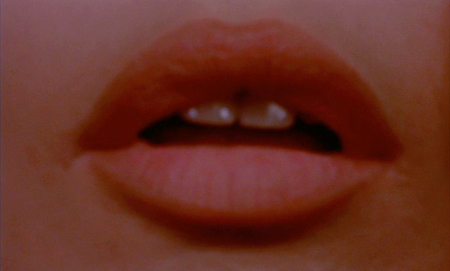
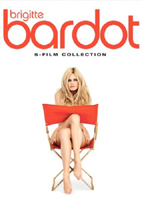
BUY IT AT AMAZON: CLICK HERE!
STUDIO: Lionsgate
MSRP: $39.98
RATED: Not rated
SPECIAL FEATURE:
• Larger Than Life: Brigitte Bardot and the Mythology of the Sex Symbol
The Pitch
In the late 1950s, actress Brigitte Bardot gained great acclaim playing uninhibited, independent young women in mainstream French movies. Her curvy, pillowy beauty and lack of self-consciousness (and clothes) was fondly appreciated by adolescent boys and tired businessmen alike, especially in Eisenhower-era America where she was often compared to Marilyn Monroe. What made Bardot different was the impression she gave that being a sex symbol was something she could take or leave, and leave it she did—but that’s another story.
Lionsgate has been doing a fine job recently, putting together box sets of overlooked films that act as supplements to famous works available elsewhere. Here we have a collection of some of Bardot’s lesser-known titles—note the five-year gap in the middle of the ‘60s, where her career was at its peak. The five movies are arranged chronologically, with a 15-minute featurette rounding out Disc 3.
Disc 1:
Naughty Girl (Cette Sacrée Gamine, 1956)
RUNNING TIME: 83 min

The Humans
BB, Jean Bretonniére, Françoise Fabian, Mischa Auer, Jean Poiret, Michel Serrault
The Lowdown
This was already Bardot’s fifteenth film, scripted by her mentor and then-husband Roger Vadim, and made shortly before her breakthrough in Vadim’s …And God Created Woman. It’s an old-fashioned door-slamming farce, in which a cabaret entertainer (Bretonniére) has to shelter his boss’ saucy daughter (BB) from the police—and his fiancée– during a money-laundering investigation. A veteran supporting cast, including Russian clown Auer, keeps things classy.
They can do only so much, though. There seems to have been an attempt here to make something like one of U.S. director Frank Tashlin’s cartoon-styled comedies, but the incidents of choreographed mayhem and silly sound effects are infrequent, with dead air in between. Michel Boisrond’s direction is inconsistent, with stodgy, stilted scope compositions and very few close-ups. Bardot’s persona as a willful user of men isn’t quite in place yet; her role might as well have been played by Debbie Reynolds. There are some interesting visual touches near the end of the film, including a set designed to look like a multiple split-screen, but the transfer is murky, the colors muted, and the print full of splices.
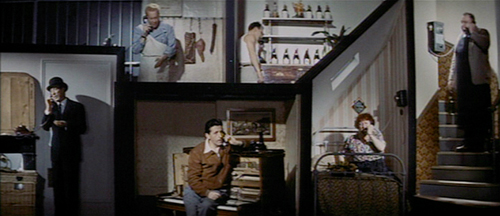
The privacy’s for shit, but you can’t beat the rent.
4 out of 10
Come Dance With Me (Voulez-vous danser avec moi?, 1959)
RUNNING TIME: 91min
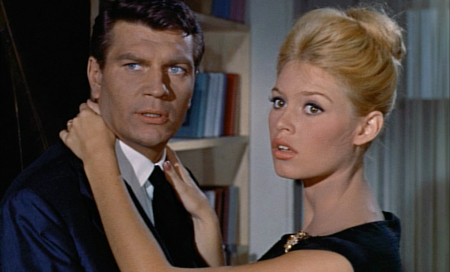
The Humans
BB, Henri Vidal, Dawn Addams, Dario Moreno, Georges Descriéres
The Lowdown
Things pick up considerably here. M. Boisrond is evidently more comfortable working in the relatively intimate aspect ratio of 1.66:1. He’s also more aware of who his star is, featuring Bardot over the opening credits. There’s a nice sense of comic timing to the early scenes as dentist Vidal becomes entangled, first with rich blonde BB, then with a blackmailing redhead (Addams). Then there’s a murder…
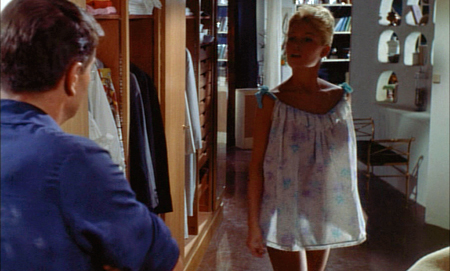
The shadow knows. Dear lord, the shadow knows.
The influences here are Billy Wilder and Alfred Hitchcock, with a skirt-billowing moment right out of The Seven-Year Itch and a classic wrong-man scenario with plenty of twists. Bardot gets to play a monogamous woman for a change: it’s a treat to see her use her powers for good– only to find herself in an environment (a gay nightclub) where they have no effect. Blink twice and you’ll miss the late great Sergé Gainsbourg’s screen début.
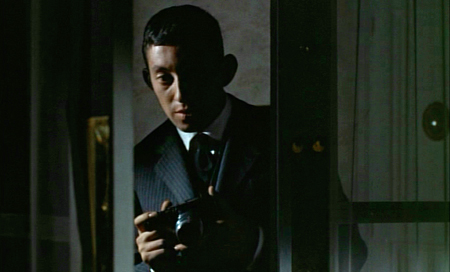
8 out of 10
Disc 2:
Love on a Pillow (Le Repos du Guerrier, 1962)
RUNNING TIME: 102 min
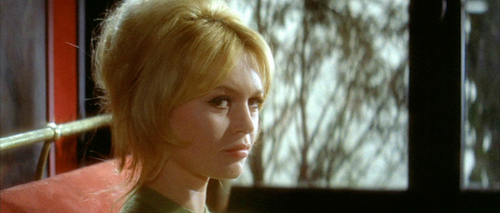
The Humans
BB, Robert Hossein, Jean-Marc Bory, James Robertson Justice
The Lowdown
A sensible, buttoned-down heiress saves the life of a suicidal man (Hossein), and finds herself taking responsibility for his well-being. Soon they’re holing up together in her dead father’s hideous apartment, only venturing outside to buy booze and hang out in jazz joints with bohemians.
This is the best-looking movie in the set. Vadim directs*, using the ‘scope frame to emphasize empty spaces and receding perspectives. Bardot is effective in a largely dramatic role, though the stereotypical existential Frenchness of the whole thing can get a little hard to take. Vadim’s assured handling of the material and the actors makes it work better than it should.
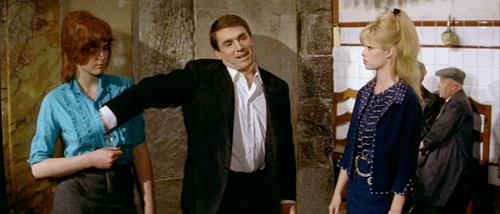
"Beg pardon. I seem to have misplaced my wallet."
7 out of 10
Two Weeks in September (A Coeur Joie, 1967)
RUNNING TIME: 92 min
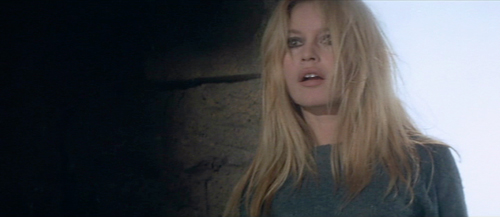
The Humans
BB, Laurent Terzieff, Jean Rochefort, James Robertson Justice, Mike Sarne
The Lowdown
Bardot is Celine, a fashion model who goes on a job in London while her husband (Rochefort) stays home. Once there, she encounters a creepy stalker (Terzieff) who follows her from shoot to shoot, takes a room in her hotel and, to my utter shock, wins her heart. I mean, what the hell:
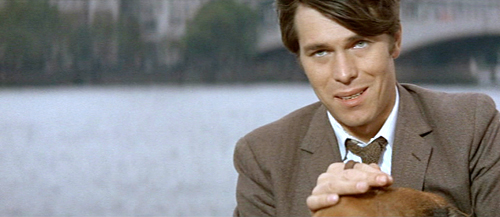
Renfield takes a personal day
We get a high quota of close-ups, some good skin from the lady, and a change of scene courtesy of a field trip to Scotland. Transfer is solid (both this film and Love on a Pillow open with a new StudioCanal logo, indicating recent restoration); story, less so.
5 out of 10
Disc 3:
The Vixen (Les Femmes, 1969)
RUNNING TIME: 87 min
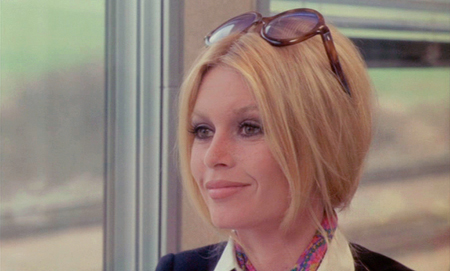
The Humans
BB, Maurice Ronet, Jean-Pierre Marielle, Annie Duperey, Christina Holm
The Lowdown
Jérôme (Ronet) is a best-selling writer who’s overdue finishing his latest book because he’s been spending all his time juggling girlfriends on the phone. His publisher decides to speed things up by sticking him on a cross-country train and hiring him a, ahem, full-service secretary. Recognizing a tacky sex-comedy setup when she sees one, Clara (Bardot) protests angrily… then takes the job anyway. Whatevs.
The greater portion of the film is set on the train, which is interesting from a production standpoint because it all appears to have been shot aboard a genuine moving train. Not so interesting? This action is interspersed with Jérôme’s flashbacks. What a sad life he’s had, getting down with countless beautiful women over the years. Sex without love? Boo freaking hoo. Like Woody Allen said: as empty experiences go, it’s one of the best.
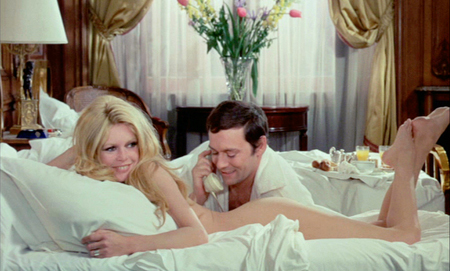
…and God created Womanitou.
This film is the most dated of the bunch, with some unpalatable examples of the Sexual Revolution in practice. See, it’s OK that Jérôme always dumps his girlfriends when things are going well because then things never have a chance to go bad. And it’s also OK that Clara allows Jérôme to basically rape her at one point because it gives her the moral high ground in their arguments later on. That’ll show him. Image is of distractingly uneven quality throughout, with a pervasive yellow-green cast to many shots. This is probably an artifact of the original photography, but a little color-correction wouldn’t hurt.
4 out of 10
The Package
The three discs come on two trays mounted book-style inside a foldout cardboard cover. This case then fits inside a puffy vinyl sleeve. It looks cool but the fit is very snug—be careful or you’ll eventually shred the cardboard.
The featurette does a good job encapsulating Bardot’s legacy, with comments from Hugh Hefner and biographer Barnett Singer, among others. It doesn’t address her later years in the public eye, which have been dominated by her seemingly contradictory stands as an animal-rights activist and a hard-right conservative, but that’s probably just as well.
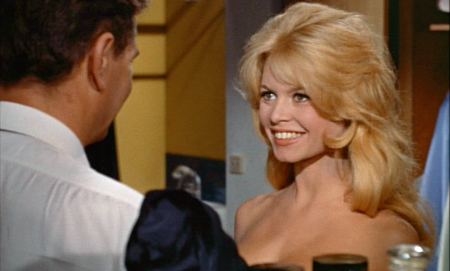
"See you next Wednesday."
*By which time, they’d been divorced for five years and he’d shacked up with Catherine Deneuve. Way to play!